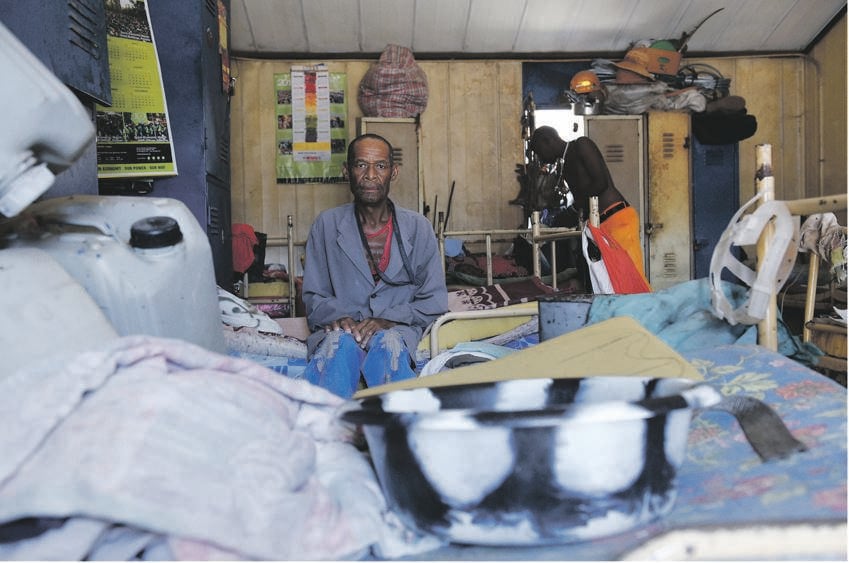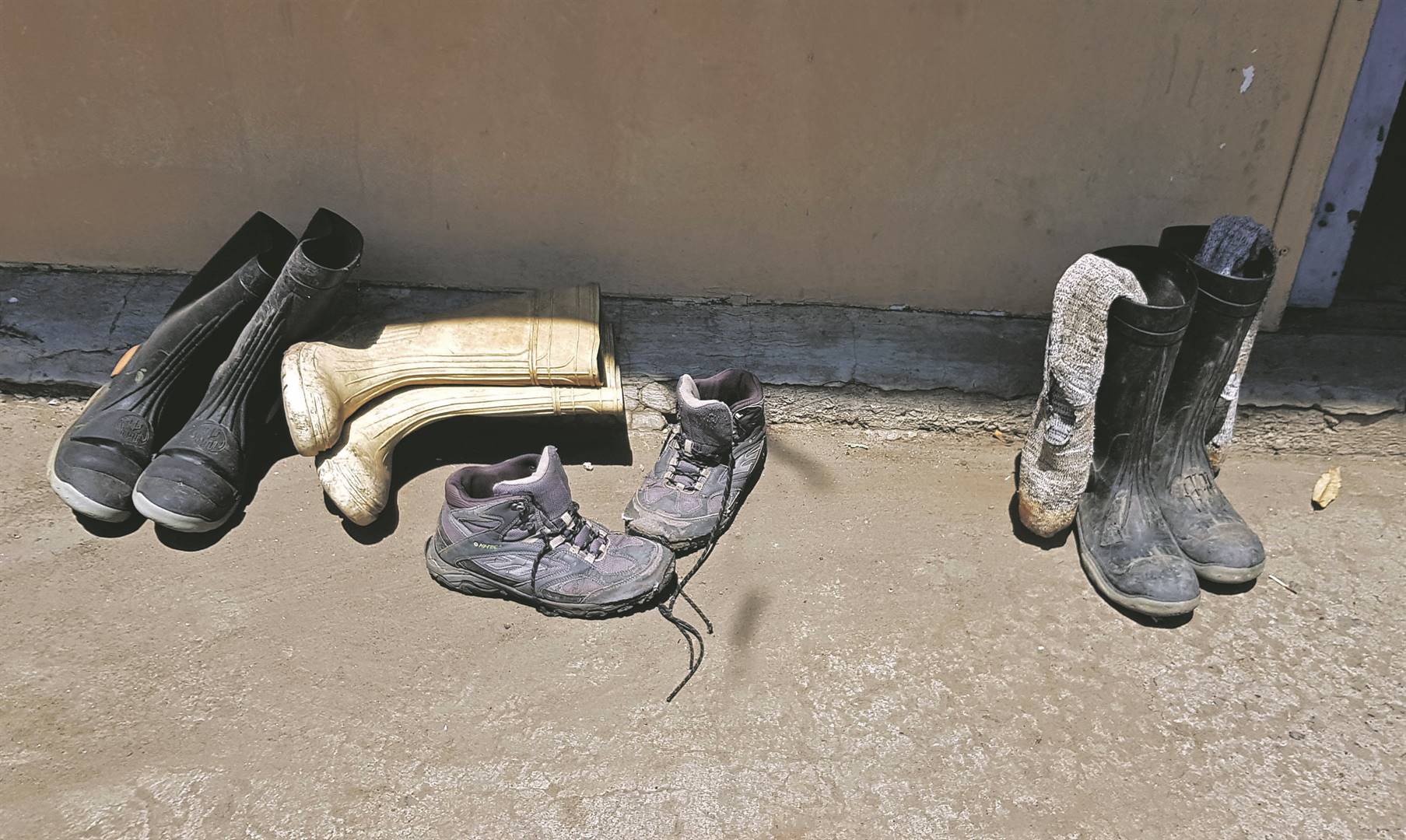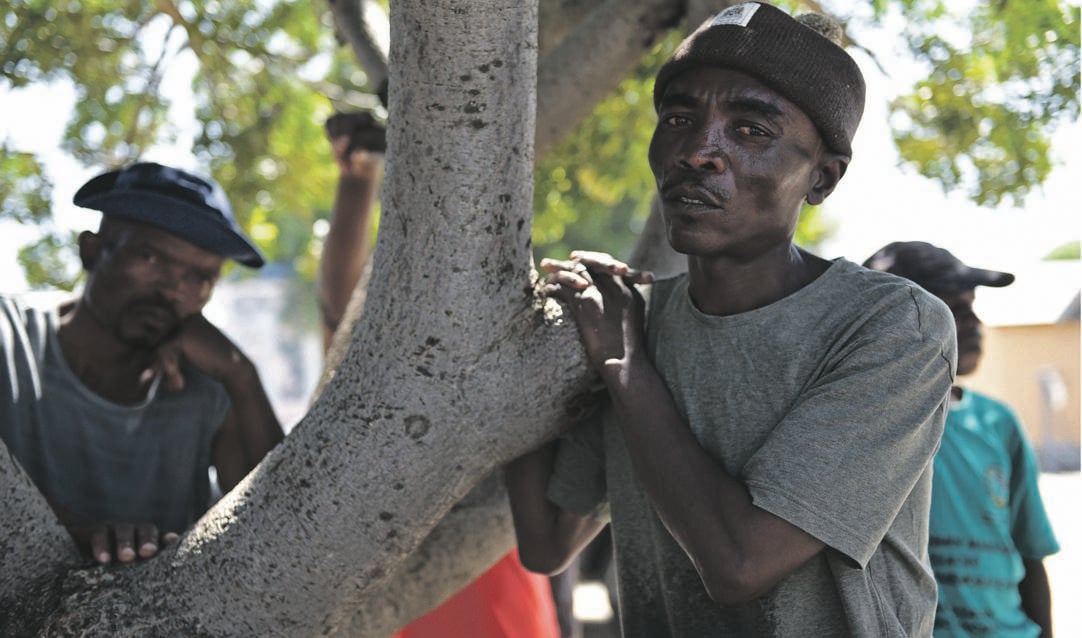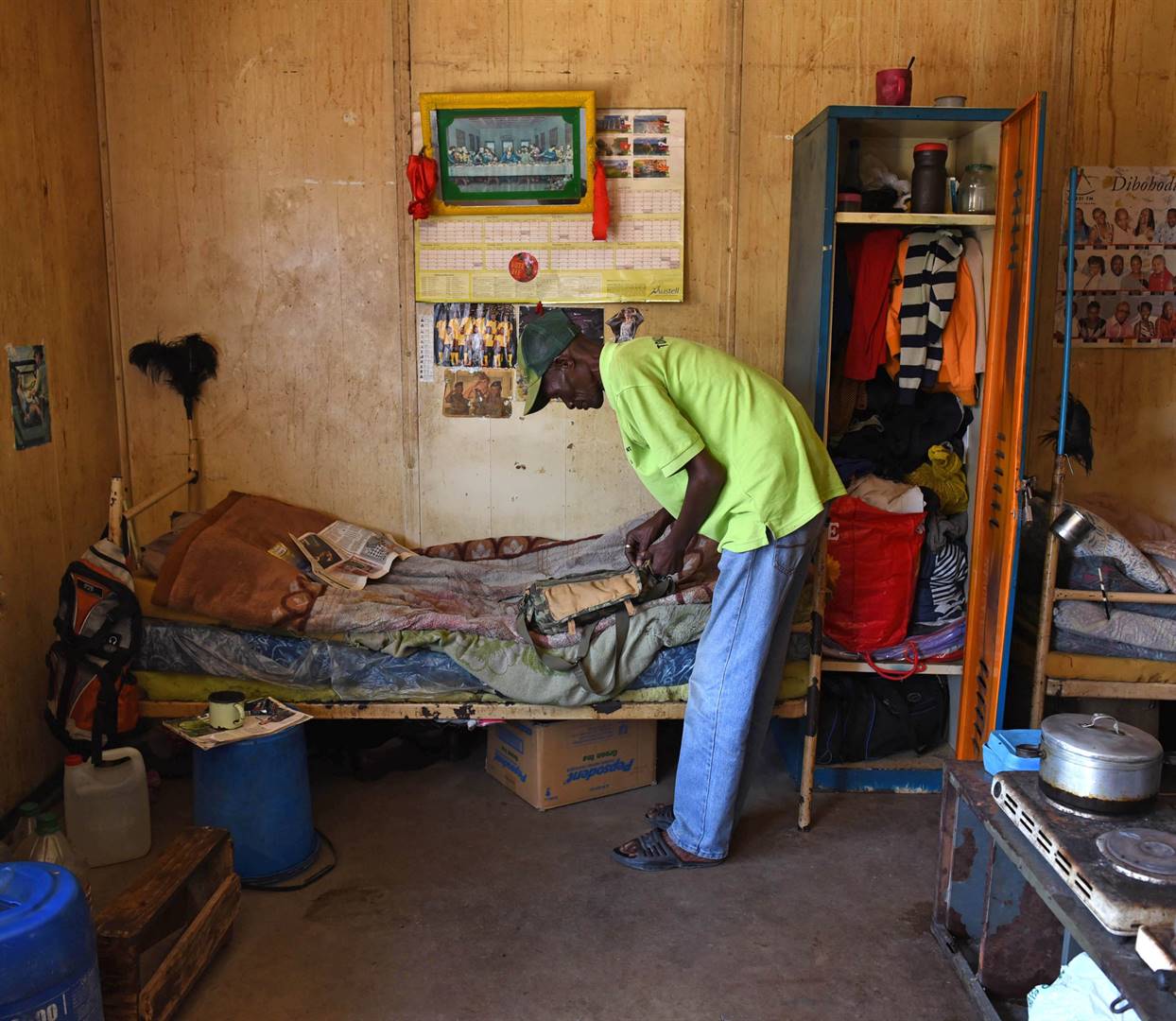The community is reeling from massive job cuts on the mines, the region’s mainstay, with many unable to make ends meet
They sit on a huge rock against the backdrop of a towering mine shaft – a place that used to define their jobs as mine workers until a few weeks ago.
It is easy to pick up from the gloomy faces of Mnikeni Nobakada and Siyabonga Phongomile that all is not well.
How can it be, when they no longer have work?
The two men are seated outside Thembelani shaft, located on the outskirts of Rustenburg in North West.
Owned by Sibanye-Stillwater, it forms part of the company’s platinum group metals operations.
The pair have now officially joined the queue of the unemployed and their future looks bleak, given the jobs bloodbath plaguing the mining industry.
Despondent former mine workers
In Rustenburg CBD, men wearing various types of work gear – some of it torn and a bit scruffy – sit in small groups lining both sides of the street.
One man cuts a forlorn figure, his eyes focused on the twig he is holding.
He is crestfallen, his head and shoulders covered by the shadow cast from the small signboard he holds, advertising his services.
The rest of his body is exposed to the scorching sunlight, but he appears oblivious to the heat.
He tells City Press that he was born in Lesotho but worked in Rustenburg’s mines for over 20 years until he was retrenched last year.
The 52-year-old, who asks not to be named, says he worked on a contract basis.
Hence, he did not receive much in benefits from his retrenchment.
He laments being stuck in Rustenburg, penniless, and with few options open to him.
“I am a mining person,” he says.
“The only workplace I have ever known is underground or in the mining environment. Here I am now, forced to sit in the streets and wait for anyone to pick me up for odd jobs – anything from gardening to waste removal – to keep me from having to go to sleep on an empty stomach, which happens often on bad days.
“There are many others here who are former mine workers, and just like me, they have given up all hope of being employed in the same industry again. It is sad that Rustenburg is not a place of hope any more; it used to be a place where we all could dream, a place of greener pastures.”
Rustenburg pastures not so green any more
While mining companies such as Glencore and Samancor have made known their intentions to cut jobs, Sibanye-Stillwater has already let go of more than 4 000 workers at its Marikana operations – 1 142 of them were retrenched, 1 709 contract workers were let go and 1 612 opted for voluntary packages.
Back at Thembelani mine, Nobakada and Phongomile, both aged 32, express their concerns about whether they will ever get mining jobs again.
They also came to Rustenburg in search of greener pastures, as did some of their relatives, who worked in mines in the same area.
For a while, they felt hopeful: they were working and were able to support their families back home.
How different things are now.
But it appears that there were warning signs. This was borne out in an interview with City Press last year, when Mpho Khunou, the mayor of Rustenburg Local Municipality, expressed concern about the faltering fortunes of the platinum-rich town.
He had explained that about 70% of Rustenburg’s economy was dependent on the mining industry.
Khunou said that by the time the platinum mining companies began to implement restructuring measures to minimise production costs – fuelled by lower platinum group metal prices – people were not surprised; they saw it coming.
Still, it did not stop the town reeling from the massive job cuts that ensued.
And now, the jobs bloodbath is happening across almost all mineral groups.
“We started getting worried as far back as 2011,” Khunou said at the time, “and we embarked on a process to look into a master plan, called Rustenburg Beyond Mining.
“We have long been aware of the vulnerability of this industry. It prompted us to hold talks with captains of industry and with our national and provincial leaders, in a bid to come up with something aligned to the National Development Plan [which aims to reduce poverty and eliminate inequality by 2030]. These talks culminated in our master plan.”
The master plan suggests promoting other sectors, such as tourism and manufacturing, as a way of keeping the town’s economy going.
The mayor also spoke of a plan that would see rock drill operators and other former mine workers acquiring new skills and working as bricklayers, or being employed at plantations or as tour guides on a simulated underground mine experience.
Such plans are still in their infancy, though. Meanwhile, residents are growing increasingly desperate.
More depressed former miners
On the other side of town, in Kroondal, not far from an operational chrome mine, a group of dejected former mine workers sit under a tree at an old mine hostel.
It has been home to them since their dismissal in 2009 for embarking on an “illegal strike”.
Much has changed since then. While a legal battle with their former employer continues, the men live in abject poverty, depending on waste recycling and hunting rabbits for their next meal.
Many have died while awaiting their pensions, having suffered from illnesses which, it is believed, were made worse by their “inhumane” living conditions.
Among these formers mine workers is 63-year-old Moletsane Kotedi, who is recovering from TB.
He was 52 when he was dismissed together with about 3 900 others.
Even then, at 52 years old, he knew that the chances of his finding employment at another mine were already slim.
Tshepo Shange (35), from Matatiele in the Eastern Cape, has also been trying for a decade to secure a job at another mine.
“My hope is gone. I haven’t worked in 10 years. Maybe they think I have forgotten all about mining. I had hoped to leave Rustenburg at retirement age, having earned enough to take me through my last years,” he says.
“All I want now is for our case with our former employer to end and for them to pay what is due to us, so I can go back home. We live in inhumane conditions here. A dog is better off because an owner gives it food, while we are left here to eat rats, rabbits and cats.”
Mining communities concerned
Popo Molefe informal settlement is located right next to Thembelani shaft.
For a place surrounded by many other shafts, unemployment would be the last thing one would expect here under normal circumstances.
But, just like Nobakada and Phongomile, many residents have ended up looking at the mine from the other side of the fence.
Community leader Albert Monare says it is depressing that communities like theirs have to live on the doorsteps of the mines.
Last Thursday, the community embarked on a protest march to Thembelani shaft, demanding jobs and empowerment.
“We are the doorstep community, the hosts, of Thembelani shaft, yet we are unemployed and live in poverty while mining companies make millions right next to us. One of the demands we have made in our memorandum is for Thembelani to recruit more people from doorstep communities,” Monare says.
Those who are still employed are just as anxious. They wake up every day, trying not to entertain their worst fear: returning home jobless.
“If those who are still employed are worried, how can the rest of us hope to get back to the mines?” says Nobakada.
“I am depressed and unsure about what will happen to me. I don’t know where to go because all I know is mining. I have been a rock drill operator since my first day on the mine in 2007.
“I came back from my family’s home after the festive season and a few days later, on January 8, I was jobless.”




 Publications
Publications
 Partners
Partners












